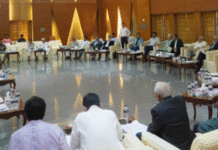‘China concerns, contributes and acts over Rohingya issue’
 Influx of Rohingya refugees in Bangladesh amid military-led crackdown in Rakhine state of Myanmar. Photo: Syful IslamChinese ambassador in Dhaka Li Jiming on Sunday said China, utilising its traditional friendship with Bangladesh and Myanmar, will do whatever they can to help alleviate the Rohingya crisis and push forward their “early” repatriation, reports UNB.
Influx of Rohingya refugees in Bangladesh amid military-led crackdown in Rakhine state of Myanmar. Photo: Syful IslamChinese ambassador in Dhaka Li Jiming on Sunday said China, utilising its traditional friendship with Bangladesh and Myanmar, will do whatever they can to help alleviate the Rohingya crisis and push forward their “early” repatriation, reports UNB.
“The most important [thing is] China acts. China has been keen to conduct various activities to push forward repatriation,” he said making it clear that China has no right to ‘lecture’ Myanmar what to do except making suggestions and conveying messages.
Terming Myanmar and Bangladesh sovereign countries, the ambassador said all the diplomatic activities of China are done following the principle of equality and mutual respect.
The Chinese ambassador was addressing a seminar titled “Finding way to Peaceful Repatriation of Rohingyas” at the Jatiya Press Club.
Former National Human Rights Commission chairman Kazi Reazul Haque, country representative of the United Nations High Commissioner for Refugees (UNHCR) in Bangladesh Steven Corliss and security analyst major general (retd) Abdur Rashid, among others, spoke at the seminar organised by English daily Bangladesh Post.
Exaggerated and Misinterpreted
The ambassador said due to “unreasonably” high expectations, and “maneuvers done by players with ulterior motives” China’s role has been, to some extent, “exaggerated and misinterpreted”.
He said it is a well-accepted idea in many countries that China has a huge influence over Myanmar, and Myanmar will listen whatever they say and do accordingly.
“This idea easily results in the belief that China is always on the side of Myanmar for economic interests and won’t really help Bangladesh,” said ambassador Jiming said adding that what he and his colleague in Yangon ambassador Chen Hai have been doing is to convey messages and make suggestions.
He said they have never forced the two sides to do anything that they do not want to. “As a friend in the middle of two neighbours who are troubled by one certain issue, China knows where the boundary of mediation lies and who the major players are.”
Tripartite Engagement
During the third informal meeting between the three countries in New York this September, ambassador Jiming said three important decisions were taken on the Rohingya issue.
First, he said, it is the political will and consensus of the three sides that repatriation must be started as early as possible.
Second, the envoy said, a Joint Working Mechanism will be established to delve into the technical issues of repatriation under the political guidance of three foreign ministers.
And third, Jiming said, promoting development is a fundamental solution, and border cooperation among China, Bangladesh and Myanmar should be strengthened to create an environment conducive to stability and development in the area.
The ambassador said the state councilor and foreign minister Wang Yi also announced that China would deploy a medical team and encourage charity organisations in Cox’s Bazar to help the people in need.
 Bangladesh is now hosting over 1.1 million Rohingyas and most of them entered Bangladesh since 25 August, 2017 amid military-led crackdown in Rakhine state of Myanmar. UNB File PhotoTo implement the ‘consensuses’, Myanmar ambassador to Bangladesh, director general (DG-Myanmar Wing) of Bangladesh foreign affairs ministry and the Chinese ambassador himself have been in touch with each other in the past two months.
Bangladesh is now hosting over 1.1 million Rohingyas and most of them entered Bangladesh since 25 August, 2017 amid military-led crackdown in Rakhine state of Myanmar. UNB File PhotoTo implement the ‘consensuses’, Myanmar ambassador to Bangladesh, director general (DG-Myanmar Wing) of Bangladesh foreign affairs ministry and the Chinese ambassador himself have been in touch with each other in the past two months.
Through frank and detailed conversations, he said, they have found a lot of common grounds, including 3450 Rohingyas who have been verified by Bangladesh and Myanmar, the Hindu Rohingyas and those living along the “zero-line” are prioritised groups for early repatriation; Myanmar has agreed to engage more with the displaced people to build trust by talking face-to-face with them and Bangladesh has agreed to allocate more resources and manpower for Cox’s Bazar and adopt a more pragmatic approach to repatriation.
The ambassador said China plays a unique role in finding a sustainable solution to the Rohingya issue. “To put it in one sentence on the Rohingya issue, China concerns, China contributes, and China acts.”
About China concerns, he said there is no doubt that China shares Bangladesh’s concerns over the Rohingya issue.
During prime minister Sheikh Hasina’s visit to China in July this year, president Xi mentioned to her that China appreciates Bangladesh’s generosity to shelter the displaced people, and will support all the parties concerned to handle the issue properly through friendly negotiations.
The ambassador said China will not favour one side over the other. “China is trying to persuade Myanmar all the time that the eventual solution to the Rohingya issue will be beneficial to both countries and, I believe, the Rohingya issue will be settled in the end.”
Back in November 2017, Chinese foreign minister Wang Yi visited Bangladesh and Myanmar to mediate between the two neighbours and came up with a three-phased solution — “cessation of violence, repatriation, and development”– which serves as an important roadmap for the repatriation process.
In June and September 2018 and in September this year, sate councilor and foreign minister Wang Yi chaired three rounds of informal meetings among China, Bangladesh and Myanmar, charting the course of action more clearly each time than before.
Explaining how China contributes, the envoy said China has been contributing to solving the Rohingya issue in many ways.
During prime minister Sheikh Hasina’s visit to China in July this year, China and Bangladesh signed an agreement based on which China would provide 2500 metric tonnes of rice to help the Rohingyas, said the ambassador.
To sum up, the Ambassador said, in the 1970s and 1990s, the same crisis happened to Bangladesh and Myanmar and the two countries were able to resolve it through bilateral approaches.
“This time, the crisis reached an unprecedented scale and gained much wider international coverage,” he said.
On the one hand, more attention from the international community has helped Bangladesh cope with this crisis while on the other hand, some actors with hidden purposes are trying to make the muddy water even muddier, the ambassador said.
UNHCR View
UNHCR representative Corliss said they have seen the Rohingyas flee from violence, oppression and the deprivation of basic human rights to Bangladesh for more than forty years now.
He said each time the Rohingya returned home – without any real resolution of the problems they faced – they were uprooted again within less than a generation and forced across the border.
Corliss said they must commit to ensuring that this is the last time the Rohingyas are compelled to seek refuge in Bangladesh.
The UN refugee agency chief said the UNHCR has been very encouraged by the emphasis that the prime minister and foreign minister of Bangladesh have placed on addressing the root causes that have made it impossible for the Rohingyas to live peacefully in Myanmar.
“My greatest motivation to work, with all my energy, toward peaceful, safe, dignified and voluntary repatriation comes from the fact that this is what the Rohingya refugees tells us they want,” he said.









